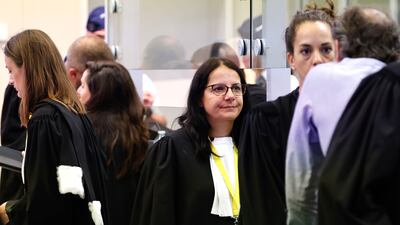A Belgian court on Wednesday rejected French terrorist Salah Abdeslam's request not to be extradited to France, saying that his claim that it would be a breach of his human rights was not “sufficiently substantiated”.
Abdeslam, 33, was transferred to Belgium from France last summer to be tried by a separate Belgian court for his role in two ISIS-claimed attacks in Brussels in 2016 in which 35 people died. He was found guilty in July on all counts and is expected to be sentenced in the coming days.
His lawyers, however, requested in early September that he not be transferred to France to serve a life sentence without parole, the country's harshest possible sentence, which was issued by a Paris court in June last year.
The only survivor of a cell that perpetrated a series of attacks in Paris in November 2015, killing 130 people, Abdeslam was sent to Belgium with the expectation that he would return by September 30, according to Belgian media.
“Sending me back to France is like sending me to my death,” Abdeslam, who grew up in Brussels, told the court on September 4. He complained that the media's strong interest in him had led him being victimised by prison guards, who beat him regularly.
His lawyers argued that his detention in France would violate articles three, six, eight and 13 of the European Convention on Human Rights, which include a ban on torture and the right to a fair trial.
They said that he had been detained between 2016 and 2022 in France's Fleury-Merogis prison in “cruel” conditions that included solitary confinement and constant camera surveillance, according to Abdeslam's legal team.
But their arguments failed to convince the court, which said in a press release that he would be able to appeal his life sentence in France “less than 25 years after it is issued”.
The court said that they had not sufficiently demonstrated that Abdeslam would be under constant camera surveillance because France only allows this practice during pretrial detention.
His prison sentence in France would also not hinder family visits from Belgium due to the geographical proximity of the two countries, nor would it stop him from planning his social reinsertion, said the court.
Abdeslam may appeal the court's decision.
Earlier this week, he showed some remorse as he appealed to a popular jury to forgive past statements that had been widely viewed as insensitive.
Abdeslam, who has always denied being involved in the planning of the Brussels attacks, said earlier this year that the people who testified during the year-long trial were not his victims.
The trial, the largest in Belgian history, has taken place in specially modified former Nato headquarters north of the capital.
Nine other men were on trial with Abdeslam, including one, Osama Atar, who is presumed dead in Syria.
Four of them – Swedish citizen Osama Krayem and Belgian-Moroccan citizens Mohamed Abrini, Ali El Haddad Asufi and Bilal El Makhouki – were found guilty on all counts of murder, attempted murder and participation in a terrorist organisation.
Tunisian Sofien Ayari and Belgian-Rwandan citizen Herve Bayingana Muhirwa were absolved of the charges of murder and attempted murder.
They all await sentencing.
Two brothers, Smail and Ibrahim Farisi, both Belgian Moroccans, were acquitted of all charges.


